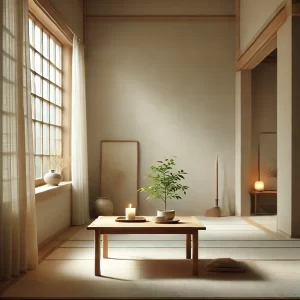In today’s fast-paced world, we often find ourselves tangled in a web of possessions, commitments, and attachments. Whether it’s physical items cluttering our homes, emotional baggage weighing us down, or obligations that stretch our time thin, it’s easy to feel overwhelmed. The idea of a more organized and practical lifestyle is becoming increasingly appealing as people search for ways to simplify their lives and regain control over their time and energy. One powerful approach to achieving this is by reducing attachments.
By focusing on the concept of fewer attachments, we can embrace a lifestyle that is not only more organized but also more fulfilling. This article will guide you through the process of creating a practical and organized lifestyle with fewer attachments, exploring strategies to help you declutter both your physical and mental spaces.
Why Fewer Attachments Lead to a More Organized Life
Simplifying Possessions
One of the main sources of clutter in our lives is the accumulation of possessions. Whether it’s clothes we no longer wear, gadgets we don’t need, or sentimental items that no longer hold meaning, the physical items in our homes can create an environment that feels disorganized. By minimizing the number of possessions we have, we create more space and allow ourselves to focus on what truly matters.
The Stress of Possessions
Clutter can trigger stress and anxiety. Studies have shown that people who live in cluttered environments are more likely to feel overwhelmed and exhausted. The constant maintenance of belongings that are no longer useful, or even just the act of searching for something you need in a disorganized environment, can contribute to a sense of chaos. By reducing physical clutter, we can cultivate a calmer and more peaceful living space.
Emotional and Mental Clutter
Another major source of attachment comes from emotional and mental clutter. We often carry around unresolved feelings, worries about the future, or regrets from the past. These emotional attachments can cloud our judgment, prevent us from living in the present, and hinder our ability to maintain an organized lifestyle. By learning to let go of unnecessary emotional baggage, we can free ourselves to live a more peaceful and productive life.
Freedom and Flexibility
When we reduce attachments, we also gain freedom and flexibility. With fewer possessions and emotional baggage, we can easily adapt to changes, take on new opportunities, and enjoy a greater sense of personal freedom. We become less tied down by the need to manage things and more able to focus on experiences that enrich our lives.
Steps to Create a Practical and Organized Lifestyle with Fewer Attachments
Assess Your Possessions
The first step in reducing attachments is to assess your possessions. Take a look around your home and consider what items you truly need and what things are just taking up space. Ask yourself:
- Do I use this item regularly?
- Does this item add value to my life?
- Is this something I can live without?
Tips for Decluttering:
- Start small: Begin with one room or category (like clothes or kitchen items) to avoid feeling overwhelmed.
- Be honest: Don’t keep items because they “might be useful one day” or out of guilt.
- Donate or sell: Items that are in good condition but no longer serve you can be donated or sold. This not only declutters your space but also helps others.
Decluttering Checklist:
- Clothing: Remove items that no longer fit, are worn out, or are simply out of style.
- Kitchen items: Assess appliances or utensils that you rarely use. Be realistic about what you need.
- Furniture and décor: Are there pieces in your home that take up space but add no value? Let them go.
Streamline Your Schedule and Commitments
Our schedules can easily become overburdened with obligations. From work commitments to social engagements, it can feel like we’re constantly running from one thing to the next. Reducing attachments in your schedule involves evaluating your commitments and being mindful of where you invest your time.
How to Streamline Your Schedule:
- Prioritize: Focus on the tasks that align with your goals and values. Let go of commitments that no longer serve your long-term vision.
- Set boundaries: Learn to say no to activities or obligations that drain your energy or add unnecessary stress.
- Practice time-blocking: Designate specific times for important activities, leaving room for rest and relaxation.
How to Evaluate Your Time:
- Create a weekly schedule: Start by listing all of your commitments. Evaluate which ones are essential and which ones can be postponed, delegated, or even eliminated.
- Use a time audit: Track how you spend your time for a week. This will help you see where you can cut back on non-essential tasks.
Let Go of Emotional Attachments
Emotional attachments can be some of the hardest to release. Whether it’s holding onto past relationships, regrets, or the fear of the unknown, these attachments can keep us stuck in the past and prevent us from living fully in the present. Letting go of emotional baggage is a gradual process that requires self-reflection, forgiveness, and sometimes professional help.
Strategies for Letting Go of Emotional Attachments:
- Practice mindfulness: Being present in the moment can help you release negative emotions and attachments that no longer serve you.
- Journaling: Writing down your thoughts and feelings can be a therapeutic way to process emotions and let go of old attachments.
- Therapy or coaching: If emotional attachments are deeply ingrained, seeking support from a therapist or life coach can provide guidance and healing.
Techniques for Emotional Release:
- Forgiveness: Holding onto grudges can be a heavy burden. Forgiving others (and yourself) helps release emotional attachments that weigh you down.
- Gratitude practice: Shifting your focus from what you lack to what you appreciate can help ease emotional attachments to material possessions and past experiences.
- Letting go rituals: For deeply held attachments, try a ritual like writing a letter to the past and then burning it. This symbolic act can help you release emotional baggage.
Adopt a Minimalist Mindset
Minimalism is not just about reducing physical possessions, it’s about adopting a mindset that values simplicity, functionality, and purpose. A minimalist approach encourages you to focus on the essentials and eliminate distractions, allowing you to create space for what truly matters.
How to Cultivate a Minimalist Mindset:
- Focus on quality over quantity: Whether it’s your belongings, relationships, or commitments, choose what adds value and brings you joy.
- Live intentionally: Be mindful of your choices and the impact they have on your well-being and your environment.
- Embrace simplicity: In all areas of your life, seek simplicity and reduce complexity. This could mean decluttering your digital life, simplifying your routines, or cutting out unnecessary tasks.
How Minimalism Impacts Your Daily Life:
- Less decision fatigue: By owning fewer items and committing to fewer things, you’ll spend less time making decisions and more time enjoying life.
- Enhanced focus: With fewer distractions, minimalism allows you to focus on the tasks and experiences that matter most to you.
Practice Gratitude
Gratitude is a powerful tool for fostering a mindset of contentment and abundance. When we practice gratitude, we shift our focus away from what we don’t have to what we do have. This helps to reduce the desire for material possessions and emotional attachments, creating a more organized and fulfilling life.
How to Practice Gratitude:
- Daily reflection: Take a few moments each day to reflect on the things you’re grateful for. This could include your health, your relationships, or even small moments of joy.
- Gratitude journaling: Write down at least three things you’re grateful for each day. This practice helps to reframe your mindset and focus on the positive aspects of life.
- Express gratitude: Show appreciation to others by expressing gratitude for their support, kindness, or contributions to your life.
Create a System for Maintaining Organization
Once you’ve decluttered your physical space and reduced emotional attachments, it’s important to create systems that help you maintain an organized lifestyle. This includes setting up routines, organizing your home, and staying mindful of your commitments.
Tips for Maintaining an Organized Lifestyle:
- Daily tidying: Spend a few minutes each day putting things back in their place. This prevents clutter from building up over time.
- Create designated spaces: Assign specific places for your belongings so that everything has a home and can be easily accessed.
- Review your schedule weekly: Take time each week to review your commitments and make adjustments as needed. This ensures that you stay aligned with your priorities.
Embrace the Joy of Living with Less
As you move forward with a lifestyle that includes fewer attachments, it’s important to embrace the joy of living with less. Reducing physical possessions, emotional baggage, and unnecessary commitments will create a sense of space, freedom, and joy in your life. You’ll find that less truly is more when it comes to creating a life that is organized, fulfilling, and purposeful.
The Benefits of Living with Fewer Attachments
Living with fewer attachments can have profound benefits for your overall well-being. By simplifying your life and letting go of unnecessary possessions, obligations, and emotional baggage, you create a space where you can truly thrive. Here are some of the benefits of living with fewer attachments:
- Reduced stress: A decluttered physical and mental environment can help reduce stress and anxiety.
- Increased focus: With fewer distractions, you can focus more clearly on your goals and priorities.
- Improved relationships: By letting go of emotional baggage, you can improve your relationships and create more meaningful connections.
- More time for what matters: When you reduce commitments, you free up time for activities and experiences that bring you joy and fulfillment.
Creating a practical and organized lifestyle with fewer attachments is not about eliminating everything from your life, but about making intentional choices that allow you to focus on what truly matters. By decluttering your possessions, simplifying your schedule, letting go of emotional baggage, and adopting a minimalist mindset, you can create a more organized, fulfilling, and peaceful life.
Start small, be patient with yourself, and remember that the journey to a more organized and attached-free lifestyle is unique to each individual. With a little effort and mindfulness, you can experience the freedom and peace that come with living a life that is free from unnecessary clutter and attachments.




